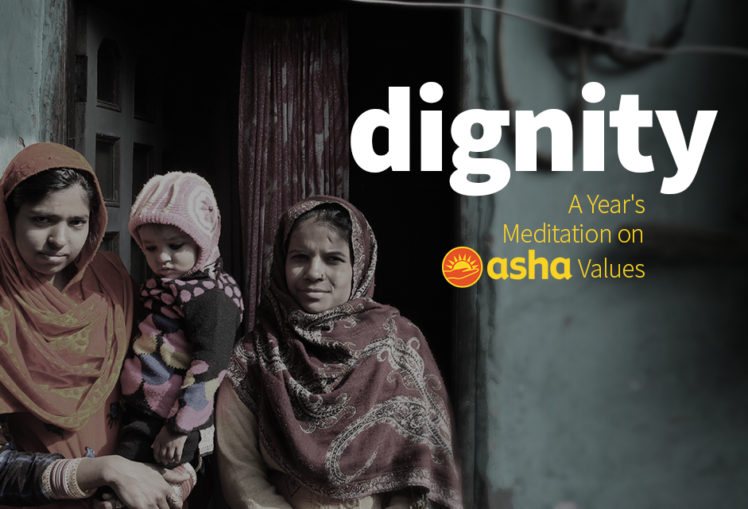Blog

Dignity | A Year’s Meditation on Asha Values
February 8, 2019
by Steve Watson, Senior Pastor
Over the past three years, one of the most powerful forces of inspiration in my life has been the work of an Indian NGO called Asha. Over thirty years ago my friend Dr. Kiran Martin, recently graduated from medical school in Delhi, heard of a cholera epidemic in her city’s slum communities. It was devastating, but not unusual news, emanating from the poorest, least privileged corners of her city. But rather than saying a prayer, sending a check, or doing nothing, Dr. Martin set up a small cholera clinic in one slum neighborhood. As she stayed, she continued to take step after step to serve and empower her new friends. The work expanded beyond health clinics to public health, women’s and children’s empowerment, economic development, and higher education access. Asha is now transforming the lives of over 700,000 residents of nearly one hundred slum communities in around Delhi.
Through my family’s and my church’s partnership with Asha’s US-based advocacy organization, I have seen firsthand the amazing results of Asha’s work and the deep interpersonal and spiritual values by which it is conducted. More than anyone else right now, Asha is pushing me (I hope!) to be a better human being—less focused on consumption and material wealth, and more on relational and spiritual wealth.
In 2019, I am letting Asha’s values guide my daily meditation and prayers. Each month, I meditate daily on one of Asha’s ten values. Today I share a few thoughts from my January reflection on dignity, the first of Asha’s values.
Asha defines dignity as “the consciousness that we deserve honors,” whether or not we possess them. Dignity is “understanding who you are and taking your rightful place in the world.” To deepen my understanding of and commitment to human dignity, I read Jean Vanier’s beautiful book We Need Each Other. Vanier is the founder of L’Arche communities, where non-disabled assistants live together with people with significant disabilities. They find community and shared life and the love of God together.
Vanier wants us to know that God trusts us and that we are important to God. He says the cry of the poor, and in some ways of us all is: Do you see me as important? Am I of value? He asks if we can know we are loved and so be freed from our fears.
I thought that my meditations on human dignity would cause me to focus on how I treat others in my life. I am aware that I don’t treat my wife and children—those closest to and most beloved by me—with the dignity they deserve, let alone acquaintances and strangers and people of low status in my world. And I have returned again and again of the question about how to honor the dignity in the family, friends, and strangers in my life.
But as I read Vanier, I found myself first returning again and again to my own life. I found myself noticing again and again the subtle ways in which fear, loneliness, or despair cloud my consciousness. I asked what it would mean to approach my work for the day with love and without fear. I asked again and again: how will I live today if I’m already important, already of value, if I don’t need to earn importance or value today?
Interestingly, during this month, I had the opportunity to prepare two different teachings on living an unselfish love of oneself. I spoke on The Liberated, Loved, Gift-Giving Self, and on Finding Our True Selves Again. The first one features the story of a man who has been so traumatized by the violence of Roman occupation that he is now named and defined by his trauma. After his encounter with Jesus, he recovers peace and also discovers he has a great gift to give to his world. This is part of what I think it means to love ourselves and to live our dignity—to know we are free, we are loved, and we possess great gifts to give today. This, no less, is our rightful place in the world.
In the first of those two talks, I told a story of an African American scholar, Reggie Williams, who as of last fall, was watching excerpts of Black Panther daily to remind himself of his free, gift-giving self. I find myself wondering what each of us—myself included—can do each day to remember: I am free, I am loved, I have great gifts to give the world today. I will except no less!
Dignity consists not in possessing honors, but in the consciousness that we deserve them. Dignity is an essential part of every human being and it can never be separated from other essential aspects of the human person. It comes not from control, but from understanding who you are and taking your rightful place in the world. – Asha Values

